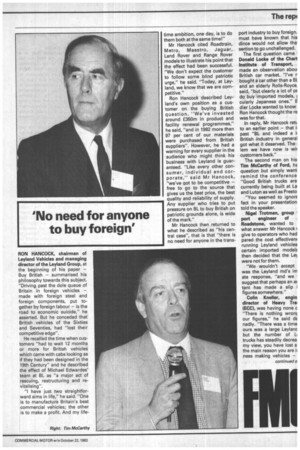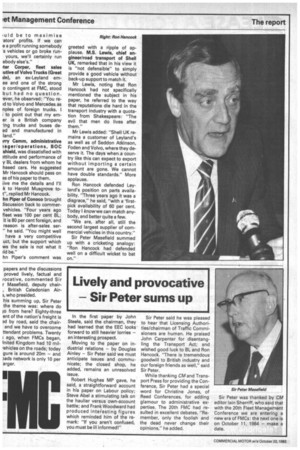'No need for anyone to buy foreign'
Page 35

Page 36

If you've noticed an error in this article please click here to report it so we can fix it.
RON HANCOCK, chairman of Leyland Vehicles and managing director of the Leyland Group, at the beginning of his paper — Buy British — summarised his philosophy towards this subject. "Driving past the dole queue of Britain in foreign vehicles — made with foreign steel and foreign components, put together by foreign labour — is the road to economic suicide," he asserted. But he conceded that British vehicles of the Sixties and Seventies, had "lost their competitive edge".
He recalled the time when customers "had to wait 12 months or more for British vehicles which came with cabs looking as if they had been designed in the 19th Century" and he described the effect of Michael Edwardes' team at BL as "a major act of rescuing, restructuring and revitalising".
"I have just two straightforward aims in life," he said. "One is to manufacture Britain's best commercial vehicles; the other is to make a profit And my life time ambition, one day, is to do them both at the same time!"
Mr Hancock cited Roadtrain, Metro, Maestro, Jaguar, Land Rover and Range Rover models to illustrate his point that the effect had been successful. "We don't expect the customer to follow some blind patriotic urge," he said. "Today, at Leyland, we know that we are competitive."
Ron Hancock described Leyland's own position as a customer on the buying British question. "We've invested around £350m in product and facility renewal programmes," he said, "and in 1982 more than 97 per cent of our materials were purchased from British suppliers". However, he had a warning for every supplier in the audience who might think his business with Leyland is guaranteed. "Like every other consumer, individual and corporate," said Mr Hancock, "we've got to be competitive — free to go to the source that gives us the best price, the best quality and reliability of supply. Any supplier who tries to put pressure on BL to buy British on patriotic grounds alone, is wide of the mark."
Mr Hancock then returned to what he described as "his central case", that is that "there is no need for anyone in the trans
port industry to buy foreign. must have known that his dince would not allow tha sertion to go unchallenged.
The first question came Donald Locke of the Chart Institute of Transport, made an observation abou British car market. "I've r bought a car other than a BL and an elderly Rolls-Royce, said, "but clearly a lot of pE do buy imported models, I cularly Japanese ones." E dier Locke wanted to know Ron Hancock thought the re was for that.
In reply, Mr Hancock retL to an earlier point — that past "BL and indeed a British industry in general got what it deserved. The lem we have now is wir customers back."
The second man on his Tim McCarthy of Ford, he question but simply want, remind the conference "Good British trucks are currently being built at La and Luton as well as Presto
"You seemed to ignore fact in your presentation told the speaker.
Nigel Trotman, group port engineer of , Roadstone, wanted to what answer Mr Hancock give to operators who had pared the cost effectiven( running Leyland vehicles certain imported modek then decided that the Le) were not for them.
"We wouldn't accept was the Leyland md's im ate response, "and we suggest that perhaps an a( tant has made a slip i figures somewhere."
Colin Kneller, engin director of Heavy Trap (ECC), was having none c "There is nothing wrorq our figures," he said de nedly. "There was a time ours was a large Leylanc but the number of L, trucks has steadily decrea my view, you have lost s the main reason you are ii ness making vehicles — luld be to maximise -ators' profits. If we can e a profit running somebody
• s vehicles or go broke runyours, we'll certainly run ebody else's."
tar Corper, fleet sales :utive of Volvo Trucks (Great kin), an ex-Leyland emee and one of the strong o contingent at FMC, stood but had no question. 'ever, he observed: "You red to Volvo and Mercedes as nples of foreign trucks.
to point out that my emer is a British company 'ing trucks and buses deed and manufactured in land."
irry Camm, administrative tager/operations, BOC shield, was dissatisfied with )ftitude and performance of y BL dealers from whom he hased cars. He suggested Mr Hancock should pass on as of his paper to them.
iive me the details and I'll k to Harold Musgrove tot", replied Mr Hancock.
hn Piper of Conoco brought liscussion back to commervehicles. "Four years ago fleet was 100 per cent BL; it is 80 per cent foreign, and reason is after-sales ser" he said. "You might well have a very competitive uct, but the support which ws the sale is not what it iId be."
hn Piper's comment was
papers and the discussions proved lively, factual and rocative, commented Sir r Masefield, deputy chair, British Caledonian Air3, who presided.
his summing up, Sir Peter the theme was: where do 10 from here? Eighty-three ent of the nation's freight is 3c1 by road, said the chairand we have to overcome ttendant problems. Twenty ; ago, when FMCs began, lnited Kingdom had 10 milvehicles on the roads; today gure is around 20m — and )ads network is only 10 per arger. greeted with a ripple of applause. M.S. Lewis, chief engineer/road transport of Shell UK, remarked that in his view it is "not defensible" to simply provide a good vehicle without back-up support to match it.
Mr Lewis, noting that Ron Hancock had not specifically mentioned the subject in his paper, he referred to the way that reputations die hard in the transport industry with a quotation from Shakespeare: "The evil that men do lives after them."
Mr Lewis added: "Shell UK remains a customer of Leyland's as well as of Seddon Atkinson, Foden and Volvo, where they deserve it. The days when a country like this can expect to export without importing a certain amount are gone. We cannot have double standards." More applause.
Ron Hancock defended Leyland's position on parts availability. "Three years ago it was a disgrace," he said, "with a 'firstpick availability of 60 per cent. Today I know we can match anybody, and better quite a few.
"We are, after all, still the second largest supplier of commercial vehicles in this country."
Sir Peter Masefield summed up with a cricketing analogy: "Ron Hancock had defended well on a difficult wicket to bat on."
































































































